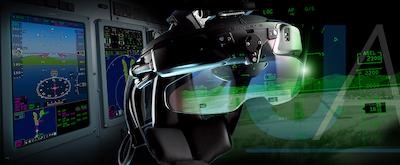Thu, Jun 20, 2019
Pilot Control Of InSight Flight Deck By ‘Look And Select’ Menu System
Universal Avionics is showcasing its Interactive-Synthetic Vision System (i-SVS) during the 2019 Paris Air Show. The innovative operator’s sight-control concept allows pilots to easily select entities on the company’s conformal SkyLens Head-Wearable Display (HWD), sending it directly to the InSight Display System.

SkyLens and InSight are both critical components for safety in today's aircraft and reliance on them by the operator varies during the phases of flight. Integrating the two technologies enables the pilot to have the key information required, right when it’s needed, all presented super-positioned on the real world. Pilots can control the InSight Display System by a ‘look and select’ menu system displayed via the SkyLens HWD with an unlimited Field of View. Sight-selection reduces operational tasks, allowing the pilot to program and update flight path, runway selection, and other commands during critical approach phases, without distracting attention from flying the aircraft head-up. The fully integrated i-SVS function allows change of runway selected, approach selected, and waypoint programing, all by looking on a virtually presented flight path and point selection with sight.
“Integrating the SkyLens HWD with the InSight Display System offers a ‘next generation’ cockpit, providing the ultimate presentation of essential flight data, precisely when pilots need it most,” said Dror Yahav, UA CEO. “The i-SVS provides an enhanced, more intuitive user interface – allowing pilots to ‘fly-by-sight’ – simply look, point, and click,” he added. “The integration also allows for improved performance with a significant reduction of workload, and a new level of safety and operational effectiveness. It’s the first step to support single pilot operation.”
As part of the NextGen roadmap, the InSight/SkyLens integration aligns with Federal Aviation Regulation (FAR) 91.176 released by the FAA, enabling the operator to perform a full landing procedure with no natural vision, where the reported visibility is as low as 1000 feet. The integrated system offers unmatched capabilities, providing dispatch and landing approach priority as well as Low Visibility Landing regardless of the destination airport’s infrastructure. Once on the ground, SkyLens can assist and guide the aircraft to the gate in poor conditions.
(Image provided with Universal Avionics news release)
More News
Aero Linx: Transport Canada We are a federal institution, leading the Transport Canada portfolio and working with our partners. Transport Canada is responsible for transportation p>[...]
Gross Navigation Error (GNE) A lateral deviation from a cleared track, normally in excess of 25 Nautical Miles (NM). More stringent standards (for example, 10NM in some parts of th>[...]
From AirVenture 2017 (YouTube Edition): Flight-Proven Booster On Display At AirVenture… EAA AirVenture Oshkosh is known primarily as a celebration of experimental and amateu>[...]
Aircraft Parachute System (CAPS) Was Deployed About 293 Ft Above Ground Level, Which Was Too Low To Allow For Full Deployment Of The Parachute System Analysis: The day before the a>[...]
Also: 48th Annual Air Race Classic, Hot Air Balloon Fire, FAA v Banning 100LL, Complete Remote Pilot The news Piper PA-18 Super Cub owners have been waiting for has finally arrived>[...]
 ANN's Daily Aero-Linx (06.29.25)
ANN's Daily Aero-Linx (06.29.25) ANN's Daily Aero-Term (06.29.25): Gross Navigation Error (GNE)
ANN's Daily Aero-Term (06.29.25): Gross Navigation Error (GNE) Classic Aero-TV: Anticipating Futurespace - Blue Origin Visits Airventure 2017
Classic Aero-TV: Anticipating Futurespace - Blue Origin Visits Airventure 2017 NTSB Final Report: Cirrus SR22
NTSB Final Report: Cirrus SR22 Airborne Affordable Flyers 06.26.25: PA18 Upgrades, Delta Force, Rhinebeck
Airborne Affordable Flyers 06.26.25: PA18 Upgrades, Delta Force, Rhinebeck



